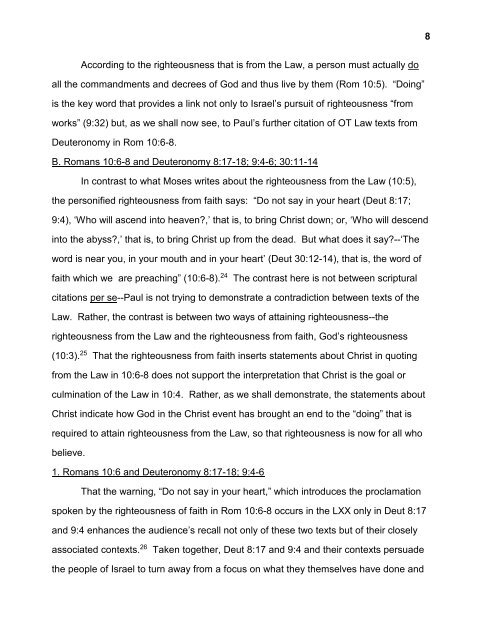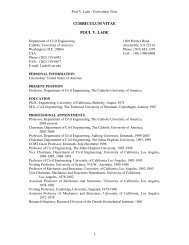Nota Bene-- C:\ARTICLES\TERMIN~1.NB Job 1 - the Catholic ...
Nota Bene-- C:\ARTICLES\TERMIN~1.NB Job 1 - the Catholic ...
Nota Bene-- C:\ARTICLES\TERMIN~1.NB Job 1 - the Catholic ...
You also want an ePaper? Increase the reach of your titles
YUMPU automatically turns print PDFs into web optimized ePapers that Google loves.
According to <strong>the</strong> righteousness that is from <strong>the</strong> Law, a person must actually do<br />
all <strong>the</strong> commandments and decrees of God and thus live by <strong>the</strong>m (Rom 10:5). “Doing”<br />
is <strong>the</strong> key word that provides a link not only to Israel’s pursuit of righteousness “from<br />
works” (9:32) but, as we shall now see, to Paul’s fur<strong>the</strong>r citation of OT Law texts from<br />
Deuteronomy in Rom 10:6-8.<br />
B. Romans 10:6-8 and Deuteronomy 8:17-18; 9:4-6; 30:11-14<br />
In contrast to what Moses writes about <strong>the</strong> righteousness from <strong>the</strong> Law (10:5),<br />
<strong>the</strong> personified righteousness from faith says: “Do not say in your heart (Deut 8:17;<br />
9:4), ‘Who will ascend into heaven?,’ that is, to bring Christ down; or, ‘Who will descend<br />
into <strong>the</strong> abyss?,’ that is, to bring Christ up from <strong>the</strong> dead. But what does it say?--‘The<br />
word is near you, in your mouth and in your heart’ (Deut 30:12-14), that is, <strong>the</strong> word of<br />
faith which we are preaching” (10:6-8). 24 The contrast here is not between scriptural<br />
citations per se--Paul is not trying to demonstrate a contradiction between texts of <strong>the</strong><br />
Law. Ra<strong>the</strong>r, <strong>the</strong> contrast is between two ways of attaining righteousness--<strong>the</strong><br />
righteousness from <strong>the</strong> Law and <strong>the</strong> righteousness from faith, God’s righteousness<br />
(10:3). 25 That <strong>the</strong> righteousness from faith inserts statements about Christ in quoting<br />
from <strong>the</strong> Law in 10:6-8 does not support <strong>the</strong> interpretation that Christ is <strong>the</strong> goal or<br />
culmination of <strong>the</strong> Law in 10:4. Ra<strong>the</strong>r, as we shall demonstrate, <strong>the</strong> statements about<br />
Christ indicate how God in <strong>the</strong> Christ event has brought an end to <strong>the</strong> “doing” that is<br />
required to attain righteousness from <strong>the</strong> Law, so that righteousness is now for all who<br />
believe.<br />
1. Romans 10:6 and Deuteronomy 8:17-18; 9:4-6<br />
That <strong>the</strong> warning, “Do not say in your heart,” which introduces <strong>the</strong> proclamation<br />
spoken by <strong>the</strong> righteousness of faith in Rom 10:6-8 occurs in <strong>the</strong> LXX only in Deut 8:17<br />
and 9:4 enhances <strong>the</strong> audience’s recall not only of <strong>the</strong>se two texts but of <strong>the</strong>ir closely<br />
associated contexts. 26 Taken toge<strong>the</strong>r, Deut 8:17 and 9:4 and <strong>the</strong>ir contexts persuade<br />
<strong>the</strong> people of Israel to turn away from a focus on what <strong>the</strong>y <strong>the</strong>mselves have done and<br />
8
















